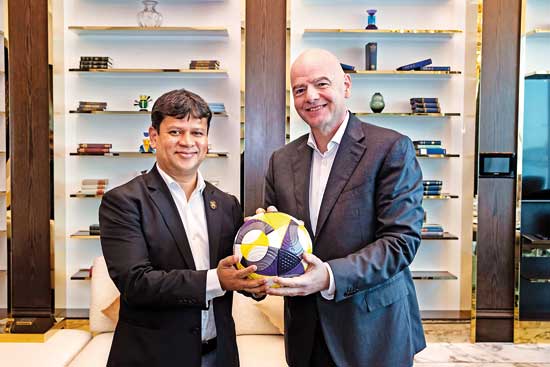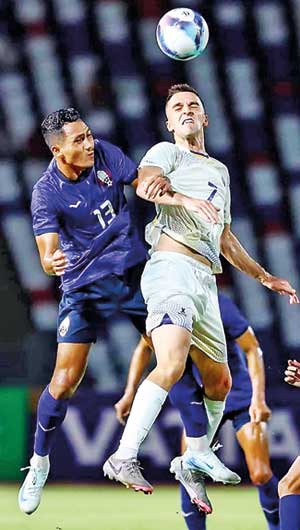Domestic football back, with a hopeful change
“We assumed the role of custodians of Sri Lankan football under challenging circumstances, including a global ban at the outset. However, I believe we are stepping into 2025 with renewed hope, having overcome the obstacles that hindered our progress. Now that everything is finally falling into place, we can aim higher and better,” Umar stated, explaining that the inability to hold local competitions over the past 15 months was a practical and strategic decision.

FFSL President Jaswr Umar when he met FIFA boss Gianni Infantino few weeks ago in Doha, Qatar
Since their appointment in September 2023, the FFSL, under Umar’s leadership, has attracted heavy criticism from various quarters, including those in the executive committee, for not addressing pressing issues promptly. Administrative hurdles, compounded by a backlog of unpaid bills to suppliers and service providers, often led to accusations of a lack of transparency and accountability. Despite the criticism, Umar remained resolute, asserting that there was never an attempt to disregard the demands for good governance within the FFSL—a practice long overdue.
“When we adopted the new constitution, under the guidance of FIFA, we were and are bound to adhere to transparency and accountability as a member nation. But Sri Lanka has been practicing old-age traditions that clearly needed change. Of course it took sometime, but we are getting there, and now the majority has come to understand it,” he added.

Sri Lanka enjoyed a successful international season in 2024
Sri Lanka solely focused on its Men’s team, who played 10 matches during 2024. They ended up winning three and drawing an equal number of games, while losing four to become the most successful team in South Asia, ahead of Bangladesh and India. FFSL rode highly on the glory of the Men’s team’s performances as the professional players contributed much to Sri Lanka’s progress, which resulted in advancing to the 200th position in FIFA rankings from 205.
In addition FFSL fielded its Women’s, Men’s U-20 and U-17 teams at international competitions, while conducting three international workshops, which according to Umar, was an attempt to “symbolically show that Sri Lanka is a footballing nation”. Yet, the country failed to see the resumption of its core domestic competitions despite member leagues of FFSL conducting their own competitions and programmes.
“Our Men’s team played against higher ranked international teams, and not against our neighbouring nations. Some may claim that as a wrong approach or a gamble, but it was something well planned. FFSL was facing a list of issues with lot of external and internal issues – a global ban, an illegal body occupying the FFSL premises that resulted in important files and data going missing, a long list of unpaid bills to the suppliers and service providers, and even losing some of the most experienced staff members due to retirement or overseas employment. Adding up to the woes was the economic crisis of the country. We were at a crossroad, and the best choice was to reestablish the country’s identity and regain the lost trust, which we eventually achieved after 15 months,” explained Umar, who further clarified that Sri Lanka had support from a few friendly countries to execute its international mission.
Though plans were made during 2024 to kick-start the mired domestic competitions FFSL still failed to deliver, extending the dearth to the third consecutive year. With a heavy backlog of pending issues, as Umar explained, FFSL received the much awaited green light when he met FIFA boss Gianni Infantino at an official event held in Doha, Qatar few weeks ago. After explaining the gradual attempt and progress Sri Lanka had made, and further anticipating to make, the FIFA chief had instructed his financial division to give priority in releasing the funds that were held up.
“No sooner we received the grant, the 80 percent of the pending bills of suppliers were paid by last week. So we are back on track, the burdens are almost off our shoulders. At the same meeting I explained the FIFA President of our own administrative issues, and he agreed to provide a financial officer appointed by FIFA from an American company to oversee FFSL finances for the next six months, until we put these practises in order. Six months is a good time for all of us to learn and adhere to the new process,” he added, hinting on the necessity to fall in line with the football administrative structure followed globally.
The intended Champions League and Super League will kickoff from end February, followed by the President’s Gold Cup and Silver Cup, which will be evolved into the FA Cup. Umar’s present FFSL intends to push top division clubs to become more professional, by looking at football in a business perspective. If the clubs could gradually follow the intended model of self-generating revenue through sponsorships, TV Rights, merchandising and other income generating avenues, clubs need not to depend heavily on grants for its sustainability, he added.
“Nobody is exploring that perspective. FFSL will take the driving seat this season, with each club on the passenger seat, learning and exploring possibilities. And from the next season the clubs should drive on their own. Football is known as the peoples’ sport in Sri Lanka, and the clubs should join hands with FFSL to elevate that status into a trend, with each team having their fans and followers as the backbone. This season will be the beginning of a hopeful modernisation of domestic football”.


